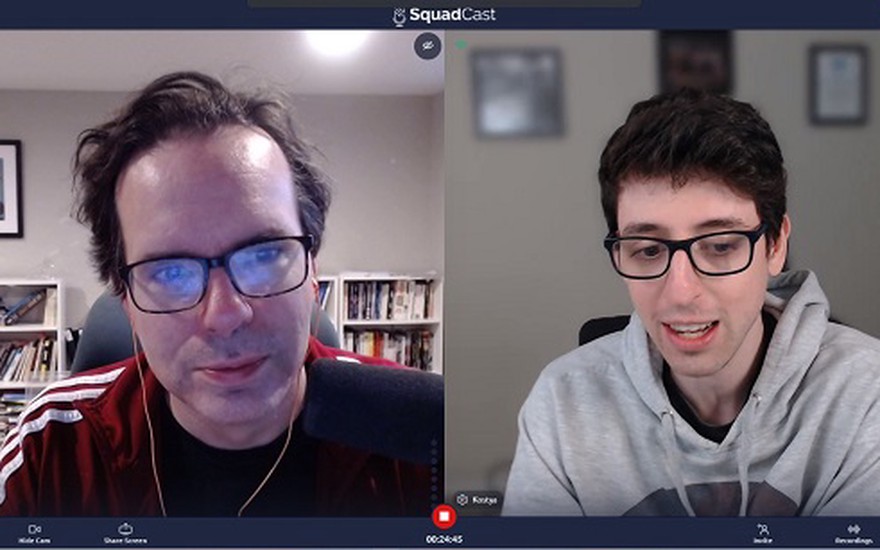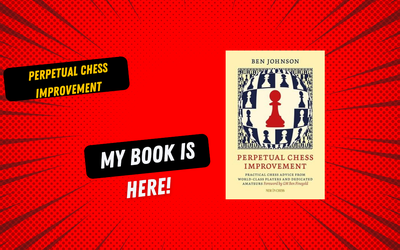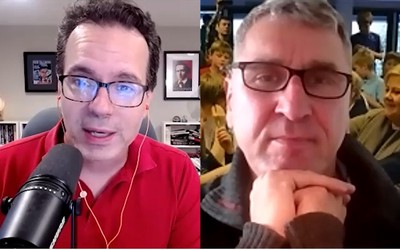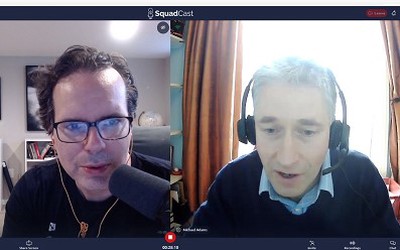
What the Sensei taught Me
Reflecting on IM Kostya Kavutskiy's Growth MindsetI am a long time fan of the content of ChessDojo's IM Kostya Kavutskiy’s, and I always particularly enjoy when he does round by round tournament recap videos on YouTube. This format of chess video, of course, has exploded in recent years as IM Levy Rozman has chronicled his tortured pursuit of the GM title and has somehow brought 400,000+ viewers along for the ride. I love Levy’s recaps, but I have been watching Kostya’s videos for years, and find them just as compelling. Kostya and Levy have very different presentation styles, so it makes for a different viewing experience. Levy does a great job conveying the wildly swinging emotions that one feels amidst the outward calm of a tournament chess game. On the other hand, Kostya’s videos, win or lose, are a lot more even-handed and clinical. I relate more to the inner turmoil that Levy embodies, but I aspire to the cool calm of Kostya.
Also, Kostya and Levy are both 300+ USCF points higher rated than me, which I think is about the perfect differential for me to extract maximum instructional benefit from their videos. This means that while they are both way better than me at chess, they do often play at a level where I am able to follow their calculations and their thought processes, and I can often relate to the decisions taken. And since they are both based in the U.S they are often playing some of the same players I might face in a tournament, and are dealing with the same issues that any weekend warrior faces in terms of time and energy management, playing underrated kids, and the challenges of finding time to train. Now, I also love a good recap of an elite player’s game, (such as Daniel King's smooth breakdown of this epic Dubov-Gujirathi tilt), but it's fair to say I don’t find the play very relatable.
https://www.youtube.com/watch?v=cftxEfEYIJ8
In December, Kostya got back in the tournament, and recap video groove after a few months ATB (Away from the Board). He played in the North American Open in Las Vegas, and by his own admission, he had a kind of mediocre tournament. In the early rounds, when paired down, he relatively smoothly navigated a field of hungry kids, but missed his shot for greater glory in the round when he was paired up against GM Vladimir Akopian. And then a minor disaster struck him in the last round, as chronicled in his video, called My Worst Move of the Year. Here it is in Kostya's video, then his blunder in diagram form:
https://youtu.be/Fdlx-WJImIA?t=1574
“Here I just kind of lose my mind a bit” said Kostya, speaking matter-of-factly
Kostya screwed up, and with one bad move, suddenly lost a long game, and went from having a decent tournament to a disappointing one, at least by rating standards. But I was really impressed with how constructive Kostya was about the tournament in his recap videos. When I have a subpar tournament, I often have an urge to either be very hard on myself, or to blame external factors, or sometimes both! Kostya was clearly disappointed with the move and the result, but was able to laugh it off on and move forward from there.
It is difficult to strike the right balance between taking full responsibility for one's mistakes without veering into self-flagellation. We all should aspire to show such equanimity in losses. When I interviewed Kostya in this week’s episode of Perpetual Chess, I asked him if he is ever tempted to blame any external forces for his results. Here is what Kostya said:
“No. I mean, I always just try to focus on the specific moves that I made and mistakes that I made. I made so many very clear mistakes in the tournament. I think I actually played pretty well throughout, except for this kind of final game where I blew it. But yeah, I think like when you're making obvious mistakes yourself, it doesn't really make sense to blame a lot of the external factors like it seems like there's a lot it could work on before I look at the system or anything like that.
That comment was made when we recorded our interview in early January, as Kostya looked forward to another tournament later in the month in California. Guess what, Kostya won that tournament, toppling 2 GMs on the way! And although he hasn’t finished posting the recap vids yet, he said it was some of the best chess he ever played! I found Kostya’s attitude inspiring even before I knew the next chapter of the saga, and now I find it even more so.
And inspiration is what I need! For on the same weekend that Kostya was playing his redemption song, I was playing my first tournament in a couple months at the Liberty Bell Open in Philadelphia. And, relative to our different skills levels, I had a tournament similar to Kostya’s in Vegas. I played 6 opponent’s all under the age of 22, a few of whom seemed to be hoovering other people’s rating points at a rapid clip of late. These are the times we live in.
Overall, I held my own in the games. I had one early bad loss, but mostly played decently and was performing around my rating. Then the last round came...
I was paired against Susanna Ulrich, a college student from Wisconsin rated 2163. Regardless of the upcoming result I was excited to play someone near my rating, after narrowly surviving a gauntlet of fast rising 1900 kids. We had a fairly even game. I was White, didn’t get much out of the opening, then briefly thought I had developed some pressure before she forced a freeing maneuver. Then, a bit low on time, but not egregiously so, I played a move that I now find inexplicable. The very next move she attacked a pawn and I couldn’t defend it. I had seen that very idea minutes before, so I am not even sure what exact thought process led to my blunder.
So I lost a pawn to a hopeless queen ending. Susanna played well and converted seamlessly, and my decent tournament had turned into a bad one. So where to go from here?
I will try to channel my inner Kostya! Yes, I have tons to work on in my game, but it doesn’t do any good to call myself an idiot. Nor does it help to try to blame tough pairings, fatigue, or the phase of the moon. Kostya has reminded me that I should redouble my efforts, work harder, try to manage my time better, and then hope to put my best foot forward in the next tournament. I hope that you all can do the same in your games!
More blog posts by PerpetualChess

My Book is Out Today! Here Are a Few More Things I Wish I Included In It
Improving Perpetual Chess Improvement
Life and Chess Improvement Lessons from GM Simen Agdestein
Magnus Carlsen’s Childhood Coach on the Joys of Keeping Things Simple
GM Michael Adams and Philip Hurtado on How to "Think Like a Super GM"
An Excellent new chess book puts a 21st century spin on the research of Adriaan de Groot